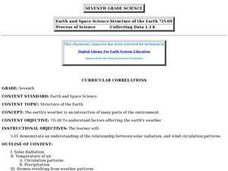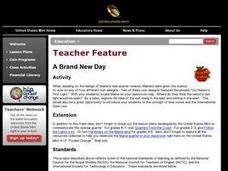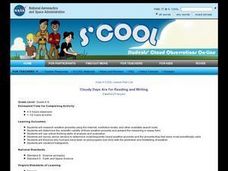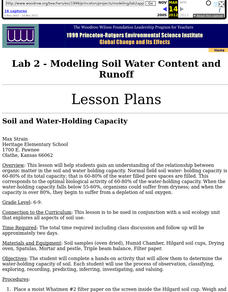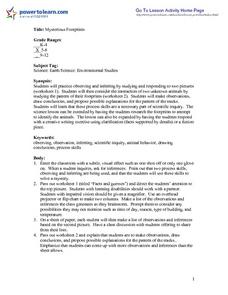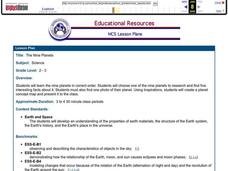Curated OER
How Do You Dew?
Students examine how the processes of condensation and evaporation occur. They describe the relationship between heat energy, evaporation and condensation of water on Earth. They give examples of the processes of evaporation and...
Curated OER
How Green Are You?
Young scholars investigate environmental care by listing ways they preserve the Earth each day. In this green living habits lesson, students collaborate in groups to brainstorm ways they can "be green" more often in their communities....
Curated OER
Mars Calendar Project
Students design a calendar that displays time on Mars. They explore the differences between time on Earth and time on Mars while making the calendar.
Curated OER
Earth's Weather
Seventh graders learn how solar radiation, latitude, and other factors affect weather. They break into six groups and are assigned a topic to research and to present their findings orally.
Curated OER
Soil Science Study
Students complete an activity by looking and gathering data on plants and soils.
Curated OER
Structure of the Earth System
Eighth graders describe the steps in the water cycle. They discuss factors that affect runoff and explain the differences between stalactites and stalagmites. They discover the importance of ground water.
Curated OER
Is the Earth Warming? a Test of the Effect of Increased Carbon Dioxide on the Thermal Properties of Air
Learners investigate the environmental and economic effects of increased carbon dioxide (CO2) content in the atmosphere.
Curated OER
A Day in the Life
Students use their research skills to investigate the behavior and characteristics of a rainforest animal. After creating a diary entry, they illustrate the habits and life cycle of the animal. They write the diary entry from the point...
Curated OER
A Brand New Day
Students locate Maine on a classroom map and discuss if Maine is where the nation's first light is found, where would the nation's last light be seen. They explore the idea of the sun rising in the east and setting in the west.
Curated OER
The Day The Earth Shook
Students explore structural engineering through three design challenges. They examine information about some architectural features that work and those that don't during an earthquake. Students build and test their structure and record...
Curated OER
Origins: Earth is Born
Students collect and identify micrometeorites from space. Students create collection devices and retrieval methods for matter. They prepare slides and view particles found. Students discuss where the identifiable particles originated...
Curated OER
Save the Earth: It's Everyone's Home
Students explore how recycling helps save trees and protect the environment. In this environmental concern lesson, students color a handout of animals that live in forests. Students discuss how recycling paper can save trees and set up...
Curated OER
Hottest, Coldest, Highest, Deepest: Science, 4th Grade
Fourth graders investigate weather patterns in their home state of Utah. After creating KWL charts, they research weather and geographical data to locate the state's extremes. As an extension, 4th graders write and illustrate books about...
Curated OER
Cloudy Days Are for Reading and Writing
Students consider a variety of well-known proverbs that refer to the weather. They research the scientific validity of these proverbs, conduct interviews about public perception of the proverbs and summarize their findings in writing.
Curated OER
Earth Processes
Fourth graders explore and discuss the process of evaporation. They discuss how wet things become dry. Students observe the process of evaporation and they make predictions about the observations they make about evaporation. Students...
Curated OER
Permeability of Earth Materials
High schoolers observe and classify the permeability of a variety of materials.
Curated OER
Mysterious Footprints
Students, after observing and responding to two pictures, consider the interaction of two unknown animals by examining the pattern of their footprints. They make observations, draw conclusions and propose possible explanations for the...
Curated OER
Radiation Comparison Before and After 9-11
Using the NASA website, class members try to determine if changes could be detected in cloud cover, temperature, and/or radiation measurements due to the lack of contrails that resulted from the halt in air traffic after the attacks of...
Laboratory for Atmospheric and Space Physics
Space Travel Guide
Looking to take a trip? Why not go to space? Here, scholars take on the role as travel agent to create a guide to their favorite planet including travel tips and sightseeing recommendations.
Chicago Botanic Garden
Are You Bigfoot?
Scholars independently explore several websites to calculate their ecological footprint. Using their new found knowledge, they answer six short-answer questions and take part in a grand conversation with their peers about how our...
Curated OER
The Nine Planets
A solid lesson on teaching the nine planets in our solar system is here for you. In it, young scientists learn the correct order of the planets, and they choose one of the planets to do a research report on. They must come up with five...
Curated OER
The Solstices
Compare surface temperatures when the solstice occurs in the different hemispheres. Young scientists draw conclusions from their investigation of data collected using spreadsheets and a globe.
Chicago Botanic Garden
Personal Choices and the Planet
The last activity in the series of four has individuals determine steps they can take to reduce their carbon footprints and then analyze their schools' recycling programs. Through a sustainability audit, they identify how and where their...
Curated OER
Solar System
Students research the nine planets on the internet using the provided links. They also search for pictures of each of the nine planets and use these pictures to create a PowerPoint slideshow. Finally, they prsent their slideshow report...
Other popular searches
- Science Earth Day Activities
- Science Earth Day Lessons
- Earth Day Science
- Earth Day Science Projects
- Earth Day Science Lesson Plans
- Earth Science Earth Day





